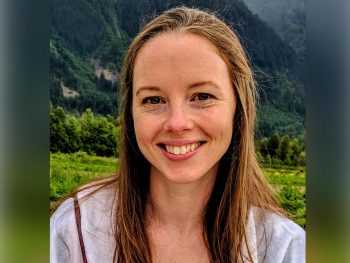Interview: Geotab’s Charlotte Argue on EVs, telematics and International Women’s Day
How has your career progressed to your current role?
My career started in the not-for-profit sector, where I managed green fleet and electric vehicle programmes with the Fraser Basin Council in British Columbia, Canada. I got involved in electric vehicles early, over a decade ago. There I collaborated with many stakeholders in government, academia, and the private sector to advance e-mobility in our region. Working with fleet operators, it was apparent EVs offer huge potential for commercial and public fleets and, if successfully integrated into their operations, would have significant impact on our transportation emissions. Fleets require data insights to successfully transition to EVs, and this is where the connected car, or telematics is essential. Without the depth of data telematics can provide, fleet management decisions are left to guesswork. Having also served on the board of a car share organisation for six years, I am fascinated by the relationship between connected, electric and shared mobility; along with autonomous vehicles, these disruptive technologies will change mobility as we know it.
I made the switch from nonprofit to tech company to immerse myself more in the connected vehicle industry, leveraging my expertise in EVs and focusing on where the two technologies overlap. I was drawn to Geotab specifically, as I had partnered previously with its EV division, and was very impressed with its work. Geotab is a leader in both telematics and EVs, helping fleets transition from typical internal combustion engines to EV in a cost-effective, intelligent and scalable way – so it seemed a great fit!
My role now centres on building awareness of our technology solutions within the EV market. As the company’s subject matter expert for fleet electrification, I keep my finger on the pulse of industry trends and help contribute toward the industry agenda, participating in various committees and working groups focused on EV policy and uptake, while also publishing unique insights we are able to draw from the collective data. I also act as a sounding board for our internal team as we build out our EV support and expand our value proposition.
What are the biggest challenges and opportunities you faced?
The world of transportation has changed significantly over the last 15 years. When I started my career, vehicle telematics was limited and not widespread. Electric vehicles were not available in the consumer market. Car share was sparse and offered by a few small, local operators or co-ops filling a community need. Working in an industry that is traditionally slow to change has its challenges, particularly as a female in a male-dominated sector. However, the advancements in technology created a sense of us all working together to pave a new path. It’s been very rewarding to be working on the leading edge of this industry, and I have worked with outstanding men and women who have been great supporters and collaborators.
What should business and industry be doing to encourage more female leadership?
Companies need to recognise that diversity in any form adds strength to an organisation. Female voices add a new perspective, but some male-dominated spaces might feel intimidating or difficult to cut through. As a company and as individuals in this space, we all need to take extra steps to ensure women are represented across the business. This includes identifying and cultivating women for senior positions, and including them in internal and external speaking engagements. It is important to make space for non-traditional approaches, ideas and solutions. As a female, I do my best to support and empower other women; having a support network goes a long way.
What’s the best advice you’ve ever received? And would pass onto others?
A woman I heard on the radio once gave advice for other women to “always say ‘yes’” to speaking opportunities. Do not decline these opportunities, even if you feel like you’re not adequate (you are!); there’s always something you can contribute that’s valuable to the discussion. This doesn’t mean you need to be an expert in everything; work within your own strengths and bring your unique experience and perspective to the table. The industry needs more female voices, and why not start with you.
Where would you like to see yourself in five years from now?
The exciting thing about working in an industry that’s undergoing rapid change is that you can’t predict what exactly you’ll be dedicating your time on in the future. The world is facing some very critical challenges, with a changing climate and declining ecosystems. No industry or sector should be sitting on the sidelines, and I’m inspired to see fleet operators large and small taking on the challenge and redefining how they do business.
As an innovative technology company, Geotab is supporting and catalysing changes across the transportation industry, and I see myself remaining on this leading edge, working in collaboration across sectors to build a strong and sustainable future.
Charlotte’s career background:
Charlotte has focused on accelerating electric vehicle uptake for the last 10 years. In her previous role as manager of Plug In BC with the Fraser Basin Council, her work included administering a green fleet rating programme and engaging with fleets along the West Coast to accelerate their EV procurement plans. Additionally, Charlotte has managed several provincial incentive programmes for public, residential and fleet charging infrastructure, and helped establish the EV outreach program, Emotive. Now with Geotab, Charlotte enables EV uptake through data-driven fleet management software.


